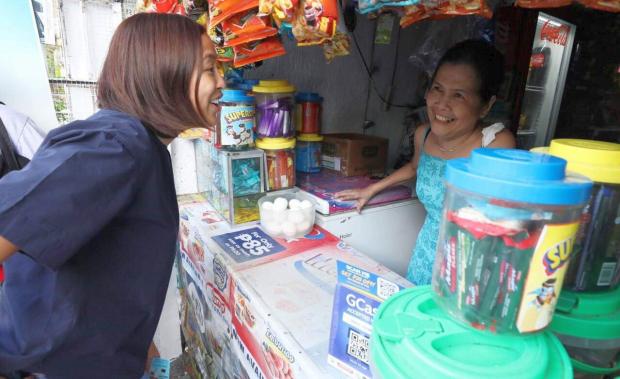
Makati Mayor Abby Binay chats with a storekeeper during one of her rounds of the city. (Contributed photo)
MANILA, Philippines — Five more barangays in Makati have been declared “drug-cleared” by the Regional Oversight Committee on Barangay Drug-Clearing, Makati Mayor Abby Binay announced in a statement issued on Sunday.
As a result of the intensified anti-illegal drugs campaign in the city, the following barangays were declared “drug-cleared” last Feb. 27: Bel-Air, Dasmariñas, Santa Cruz, Pinagkaisahan, and Post Proper Southside.
Binay commended the barangay chiefs, the Makati Anti-Drug Abuse Council (MADAC), the Makati City Police Police, the Makati office of the Department of the Interior and Local Government, and the anti-drugs taskforce for their hard work in eradicating drugs in the city.
The chiefs of the newly declared drug-cleared barangays are as follows:
- Constancia Lichauco of Bel-Air
- Martin Arenas of Dasmariñas
- Virginia Salenga of Santa Cruz
- Fernando Bolo of Pinagkaisahan
- Maribel Vitales of Post Proper Southside
“Congratulations to the five barangays for achieving a drug-cleared status,” Binay said. “We honor the anti-drugs taskforce for your exemplary efforts to eradicate illegal drugs and its accompanying unlawful acts in the city. Let us continue to work hand-in-hand to put an end to the illegal trade and save the future of our young Makatizens.”
A barangay has to meet the following conditions to be declared drug-cleared, as set forth in Section 8 of the Dangerous Drugs Board Regulation No. 3, series of 2017:
- non-availability of drug supplies
- the absence of drug transshipment activities
- the absence of clandestine drug laboratories
- the absence of clandestine drug warehouses
- the absence of clandestine chemical warehouses
- the absence of marijuana cultivation sites
- the absence of drug dens, dives, or resorts
- the absence of drug pushers
- the absence of drug users and drug dependents
- the absence of protectors, coddlers, and financiers
Other criteria include the following:
- active involvement of barangay officials in anti-illegal drugs activities
- active involvement of Sangguniang Kabataan representatives in maintaining the drug-liberated status of the barangay
- the existence of drug awareness, preventive education and information, and other related anti-illegal drugs programs
- the existence of a voluntary and compulsory drug treatment and rehabilitation processing desk in the barangay
The certifications were validated by Philippine Drug Enforcement Agency – National Capital Region (PDEA – NCR) Regional Director III Joel B. Plaza and certified Senior Supt. Rogelio Simon, chief of the Makati City Police Station.
From May 10 to Nov. 23, 2018, the Makati police conducted 333 anti-illegal drugs operations. This resulted in the arrest of 588 illegal drugs personalities and seizing of a total of P769,021.78 worth of dangerous drugs (DDB value).
In 2018, the Preventive, Education, Training and Information Dissemination Services (PETID) division of MADAC conducted a Special Drug Education Program Symposium to Makati public schools benefitting some 10,170 students. The symposium discussed the adverse effects of abuse and misuse of dangerous drugs on individuals and families, at the workplace, and the entire community.
An Out of School Youth (OSY) Parent Effectiveness Seminar was also conducted for some 324 parents and guardians of Special Program for the Employment of Students (SPES) and Government Internship Program (GIP) applicants. Discussed at the seminar were the impact of addiction on families, their role as parents and the rehabilitation and recovery phase from illegal drugs.
A total of 25,793 individuals including city government workers, barangay personnel, clients of city rehabilitation programs, detainees of the Bureau of Jail Management and Penology, and drivers of public utility vehicles underwent Random Drug Testings.
The project aims to identify those individuals who are using drugs and recommend appropriate treatment for them through the Drug Dependency Examination (DDE).
Meanwhile, Makati’s Drug Free Workplace Ordinance City Ordinance (2018-084) has also been approved by the City Council to ensure the maintenance of a safe and healthy work environment free from the use of dangerous drugs.
To date, Makati has nine drug-cleared and drug-free barangays. Certified drug-free barangay included Barangays Urdaneta and San Lorenzo, while Barangays Forbes Park and Magallanes were declared drug-cleared.
According to the DILG-Makati, barangays that were initially validated by the PDEA as “drug-cleared” will receive a “drug-free” certification once it could consistently show zero illegal drug incidents.
As set forth in Section 11 of DDB Regulation No. 8, series of 2017, after conducting drug-clearing operations in the barangay, the oversight committee will issue the drug-cleared certification of a barangay that had complied with the parameters set by the board regulation.
The local chief executive or the ADAC chairman will then attest to the certification made by the local chief of police and validated by the PDEA regional director. /atm